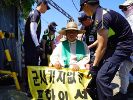Eye For Film >> Movies >> The Coming War On China (2016) Film Review
The Coming War On China
Reviewed by: Amber Wilkinson

"The aim of this film is to break a silence," says John Pilger describing his 60th documentary for ITV. This time, his sights are set on the Pacific, and specifically the hawkish activities of the US military in the region. As Pilger puts it, American military bases form a "giant noose" around China and the journalist sets about building the argument that this sort of sabre rattling could all too easily bring us all to the war.
Pilger's film performs something of a noose manoeuvre itself, skipping back in time to discuss nuclear bombs of the past before slowly closing in on the current situation from a number of angles. This has the effect of leaving the politics largely to one side, in favour of examining the impact of US military activities in the region on the local populace. Those who are drawn to this film will no doubt be aware of the horrors of the nuclear testing on Bikini Atoll in the Marshall Islands, in particular the H-bomb Bravo, which laid waste to the area and left virtually everything and everyone in the vicinity poisoned as a result.

Pilger pays close attention to the details, allowing first-person testimony to help the horrors hit home, while outlining the argument that the US not only were more than happy to bomb the islanders but also cheerfully encouraged them to return to their homes on the Rongelap Atoll, telling them it was safe to do so, even as they were essentially using them as guinea pigs to test the effects of radiation poisoning as part of a sinister experiment known as Project 4.1. This section of the film is particularly chilling not only because of the horrific injuries suffered by many affected by radiation but because of the inclusion of segments of archive film from the time that are dripping in racism. Speaking about the mayor of Rongelap, the narrative describes him as "a savage... but a happy, amenable savage".
The words, you might say, are a lot less harmful than radiation poisoning but they form a disturbing undercurrent right through this documentary, as several of the representatives of the US government position use semantics as a way of tainting meaning or we see how the branding of China as "the Yellow Peril" has had a lasting impact on attitudes towards the country from the West. It's also to see how a specifically Christian set of linguistics also came to be used - scientists described as 'priests in long, white coats," for example - another way of marking out non-Westerners as "them", not "us".
Back in the present day, the US are still firing missiles at the Marshall Islands, building bases in the region that look like golf resorts while neighbouring islands used by the locals who provide staffing struggle for even the most basic of amenities. Now, of course, there is opposition and Pilger rounds up the various countries who are also fighting what they see as 'cuckoo in the nest' occupancy by the US.
On Okinawa, the locals are fighting their own government to protect their land from militarisation, while on the Korean island of Jeju, a priest holds Mass twice a day at a base as a form of protest. Pilger keeps the focus on these voices of solidarity, interweaving them with academics who claim the Chinese aren't interested in expanding their borders. This is where the film falls down slightly, as virtually no mention is made of the Chinese economic expansion into countries in Africa or elsewhere in the world, where infrastructure is often being paid for in yuan. There is some attempt to show the poverty/wealth gap in China is widening and an acknowledgement of the country's human rights violations but Pilger doesn't stray too far from his main argument. He also has occasional tendencies towards 'Werner Herzog' philosophising, such as when he says of the H-bomb crater: "As our plane flew low we seemed to touch its deathly void."
He does cleverly give the local US ambassador enough rope to hang himself though, as his evasive answers make him appear decidedly shifty, particularly when he denies there are 'military bases', busily referring to them by other terms. It's a powerful reminder, underscored recently by Trump's election to the White House that terminology can be used to normalise objectionable ideas or at the very least distract from their true weight. Pilger's argument is rather sprawling but there is a large amount to think about here, not least the suggestion that the difference between China and the US's brands of capitalism is that "capital doesn't rise above political authority" in China and the assertion that despite being a one party state, China's political policy has shifted considerably more than that of the two-party political landscape of America.
The film is bang up-to-date, including some of president-elect Trump's most excessive comments on China and, despite its length and occasional lack of focus, offers a comprehensive argument for paying more attention to what is going on in the Pacific. Pilger's triumph is to show how important people are as cog in this wheel, many are resisting and he invites others who care about peace to stand with them no matter how far away they are.
Reviewed on: 29 Nov 2016

















